

Secondary schooling for Don started at Murray Bridge High School and was completed at Adelaide Boys High School. In his final year at school, Don studied English, Physics, Chemistry and Mathematics.
Don was a student at the University of Adelaide where he obtained the degrees BSc (Hon), Dip. Teach. and PhD in Chemistry.
Don has worked in some interesting places, including:
Tennis, golf and fishing are Don's sporting interests. His other recreation includes wine tasting and wine clubs, cooking restaurant quality food on a BBQ, eating out, making the worlds best cappucino, gardening and bush walking.
Interviewer: What is the main purpose of your research or the genetic technique you use?
Dr Phillips: We are using molecular biology techniques to investigate the mechanism of action of some anticancer drugs. We hope to use the information we get to develop better drugs for the treatment of patients with cancer.
Interviewer: Can you describe briefly how you are doing whatever you do?
Dr Phillips: We are looking at the interaction of the drug with DNA. Specifically, we are asking
Interviewer: Who or what (animal or plant) will benefit from your research/techniques?
Dr Phillips: Cancer patients will benefit if we are able to help in the development of highly active new drugs for chemotherapy.
Interviewer: What are the economic implications of your applied genetics? (How expensive is it to do? What will be/are the cost benefits of the outcome?)
Dr Phillips: The initial cost of a project such as this is in paying for research such as my group is doing. This costs about $150,000 a year just to maintain the laboratory and it could require up to ten years. of research Next, the drug companies need to develop the new drug, test it, gain the needed approvals, and eventually market it. This could cost another $10 million. But at the end of it all, a highly effective drug, which the drug company has patented, could earn the company, and its shareholders, $10 - 50 million a year, or even more.
Of course, there is also an economic benefit to society if a more effective drug is found. The cost of treatment and care of cancer patients would be reduced if they were getting better quicker and returning to productive work.
Interviewer: Historically, what is the scientific background to the research you are now doing?
Dr Phillips: The anticancer drugs which are used at present have been around for some time and there has been no improvement in their efficacy. Those which are in use are poorly understood in terms of their mechanisms of action.
Without knowledge of how these drugs act, at the molecular level, we are not likely to see any improvement in them.
With the new methods of biotechnology available today, the time was right to begin to look at this problem.
Interviewer: For a Year 12 Biology student to understand what you are doing, some background knowledge of biological concepts will be needed. Can you tell me what biology is relevant to what you are doing, and why?
Dr Phillips: To understand what goes wrong in cancer, the students must first understand what happens in normal cells. This means that they need to understand the normal cell cycle, and the normal process of mitosis which leads to cell division.
In cancer, the cells seem to avoid the normal controls and they proliferate continuously by mitosis. Not only does this happen, but the cells also fail to respond to the normal signals which cause cell differentiation. So a growing mass of useless cell develops -- a tumour or cancer.
Since it seems that the problem is to do with DNA, or regulatory genes, it is necessary for students to have some understanding of these ideas too.
We are looking at the interaction of anticancer drugs with DNA, looking at several possible mechanisms of action.
There are about 50 different anticancer drugs available at present, and they are provided to us for our research from a wide range of pharmaceutical companies. Approximately half of these are organic compounds which can react with DNA. Many of these drugs block the enzymes DNA polymerase or RNA polymerase therefore inhibiting the critical cellular processes of DNA replication and transcription.
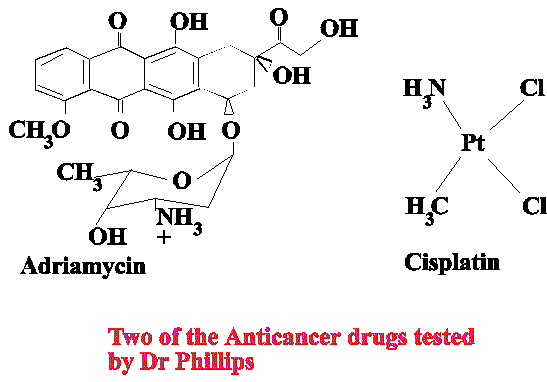
Dr Phillips: A flow-chart shows the steps we take to look at whether an anticancer drug forms interstrand crosslinks with nuclear DNA.

![]()

![]()
![]()
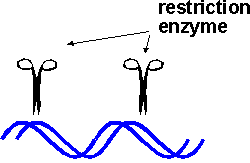
![]()
Treat restriction fragments to separate the DNA strands
(Strands which drug has cross-linked will remain double stranded)
![]()
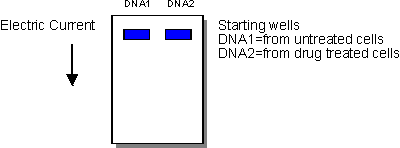
![]()
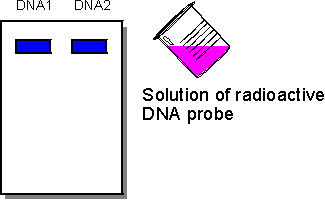
![]()
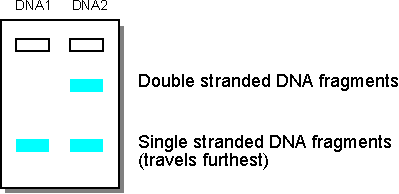
We use breast cancer cells growing in cell culture to test the drugs, because the DNA can be readily isolated from a large number of these cells at any time after exposure to the drug.
We incubate the cells with the drug for 4 - 5 hours.
Then we wash the drug off the cells and use use biochemical methods to isolate the nuclear DNA.
Next we examine the DNA to see how much damage the drug has caused. Of course we always compare the drug treated DNA with DNA from untreated cell which acts as the control.
If we incubate the DNA with restriction enzymes we can digest the DNA into small pieces called restriction fragments. These can be separated from each other using gel electrophoresis.
The DNA on the gel can be located using specially made probes, which can be specific for either nuclear or mitochondrial DNA. The technique of locating the DNA with the probes and visualising it is Southern blotting.
What we are looking for is the evidence that the drug has cross-linked the DNA chains. Because alterations to the DNA structure such as this would alter the chemical properties of the DNA, we can detect it since the crosslinked DNA moves more slowly through the gel and is therefore separated from the single stranded DNA. The following diagram shows the type of result we get when the DNA is crosslinked by a drug.
Interviewer: What do you see as the major biological implications of the work you are doing? For example: Are genotypes or phenotypes being altered? Is a species survival potential increased? Will someone or something have a better quality of life?
Dr Phillips: The survival potential for people with cancer is certain to improve if we can develop better anticancer drugs. These people will also have a better quality of life.
The drugs used at present are expensive, and they generally make the person who is already ill with cancer very sick during and after the treatment. Cancer patients who have had one or two courses of chemotherapy often refuse further treatment because the treatment makes them feel so terrible. And I'm sure that you have heard how chemotherapy often makes the patient's hair fall out.
If we can develop drugs which target just the cancer cells, which work well and do not cause the unpleasant side effects, we will have certainly made a difference to the lives of these people.
Interviewer: There is often discussion or debate about issues associated with biotechnology. What is one such issue relating to your work? Can you outline the arguments of the opposing sides of the debate please?
Dr Phillips:A question which is often asked is 'should individuals or companies become wealthy as a result of the development of anticancer drugs?' There are certainly two sides to this question.
It could be argued that the inventors of useful drugs have a right to patent such drugs and profit from it, or why would they bother to do it? As I said earlier, it is an expensive process to develop a new drug, and both the individuals and companies who invest their time and money do so in the expectation that they will be rewarded once the drug is in common use. The drug companies have shareholders who have invested to make a profit and research into other forms of treatment of diseases would be diminished in the future if there was no profit for active drugs.
On the other hand, the question arises of who does pay for the treatment with the new drugs. Is is reasonable to exploit sick people, especially if they are poor? Is it something governments should pay for? What about people in poor countries, are they precluded from such treatments because of their poverty?
These are difficult questions with answers depending on where you view it from.
Interviewer: Can you suggest some reading material relevant to anything we have discussed about your work, its implications and issues associated with it?
Dr Phillips:An Internet search starting with "chemotherapy" might provide some useful material. Students may also be able to find information relevant to this topic in publications such as New Scientist and Scientific American, which both have Internet sites as well as the magazines.
(Author's note: An search of Alta Vista using "chemotherapy" got more than 30 000 hits! Many of these hits describe clinical situations and patient reaction to 'chemo'. Material such as this, whilst interesting, is of little relevance to CAT 2 and students should be discouraged from including too much of a clinical nature in CAT 2 reports.)
Interviewer: Thank you for your time.For ideas on where you might find additional resource material, look again at the section Resources on another page at this site. And don't forget the power of the Internet to provide you with information. A well thought out search, using a search engine such as Alta Vista, should provide more information than you can possibly use!
Please do not phone Dr Phillips for further information for your CAT. He, like the rest of the staff in Biochemistry, is a busy person. However, if you think we can help you some more, use either the comment form or the email address for this site and we will do what we can.
If you would like to read another interview with a La Trobe Biochemistry scientist, you can click here to go back to the Interview Index.
If you would like to 'netsurf' for some more resources, you might find the author's favourite Biology Bookmarks helpful.